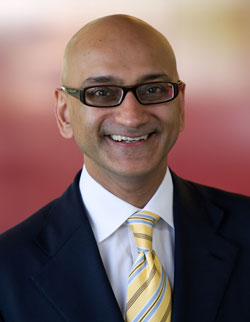For this episode of the podcast, I chat with Atul Tiwari, the managing director of Vanguard Investments Canada. He seriously has such a wealth of knowledge, it was such a treat to ask him pretty much anything and everything about Vanguard, passive investing, and some key things we Canadians need to know about how to invest for our futures.
To give you a little background on Atul, he joined Vanguard in 2011, but before that was the senior vice president of BMO Asset Management and founding president of BMO Exchange Traded Funds. Before that, he was president of BMO’s U.S. subsidiary mutual fund business, Harris Insight Funds. If that wasn’t impressive enough, he used to practice law.
Why Low Fees Are So Important
This is a subject that comes up no matter who I’m talking to about investing. Probably because absolutely no one likes to pay high fees! Why would they? As Atul said in the podcast, “The best predictor of your investments’ performance is the cost of them.” In other words, no one can predict the outcome of your investments, but you can control one thing — the fees you pay. The lower the fees, the more money in your pocket.
The thing is, most people have no idea how much they are paying in fees. Typically, if you’re invested in actively-managed mutual funds, you could be paying 2-2.5% on your investments. If you earn a 6% return on your investments, that leaves you with only 3.5-4% after fees. That may sound like nothing, but after decades of investing, that could amount to hundreds of thousands of dollars. That’s why I’m personally a big fan of low-fee index mutual funds and index-based ETFs. They offer the same diversification as actively-managed mutual funds, they track the index, and they have way lower fees.
Index Funds in Canada vs. the U.S.
This is something I swear no Canadian really knows about. I only figured out the difference when I started doing research about it and talked to a rep at Vanguard for my blog post on investing with Vanguard. They would be the people to ask since Vanguard developed the first-ever index mutual fund in 1975.
So, when people are talking about index funds in Canada, more times than not they are actually referring to index-based ETFs. In Canada, there are two popular providers of index mutual funds, Tangerine and TD E-Series. Many other banks also provide them though, but you usually have to work with one of their advisors. Beyond that, almost all banks and credit unions in Canada offer actively-managed mutual funds, and all the robo-advisors in Canada strictly offer index-based ETFs. Then there are the self-directed brokerages like Questrade, though almost all the big banks have their own self-directed brokerages as well. Using those brokerages, you can essentially buy any type of investment product like ETFs, actively-managed mutual funds, stocks, bonds, etc. You cannot however buy index mutual funds.
Those can only be bought through the ways I mentioned above. Confusing right?
Well, the reason I think we Canadians get confused about some of this is that we get a lot of our information from the U.S. In the U.S., index mutual funds are much more popular, and you can even buy them directly from Vanguard. In Canada, you have to go through a brokerage, robo-advisor, or financial institution to buy any of Vanguard’s products.
This is all to say that the next you’re talking with someone and they mention index funds, ask them whether they mean index-based ETFs, and then feel free to share this episode with them.
The Vanguard Effect
Atul mentioned in the episode a thing called “The Vanguard Effect” which was originally coined by Morningstar. What this effectively means is that when Vanguard enters a new market, like Canada (though it was originally coined when it entered the U.K.), because it offers such low-fee products, it causes other investment product providers to also lower their fees.
It’s a good thing for us Canadians especially since we have some of the highest fees in the world. Let’s hope things continue down this path in the future!
Vanguard Investor Questionnaire
Vanguard has a number of great free resources on their website, but my personal favourite is the Investor Questionnaire. It’s a great example of how to determine your risk tolerance and ideal asset mix. This is just a great thing to try out if you want to see how it compares to the investor questionnaires provided by the robo-advisors in Canada, or if you plan on becoming a DIY investor and need a starting point when building your own portfolio.
Click here to try out the investor questionnaire

+ show Comments
- Hide Comments
add a comment